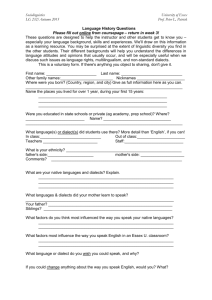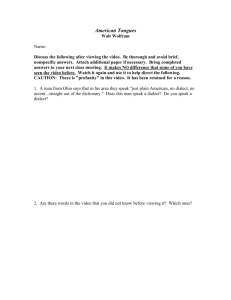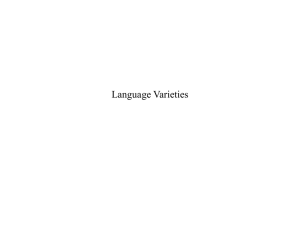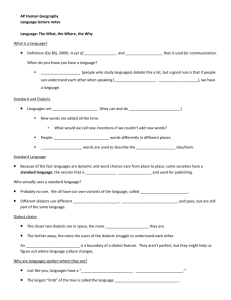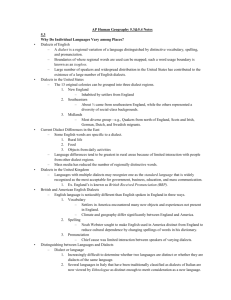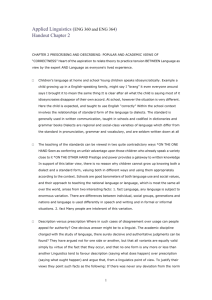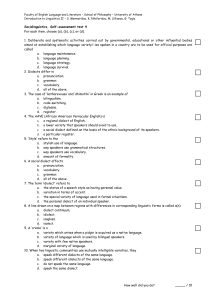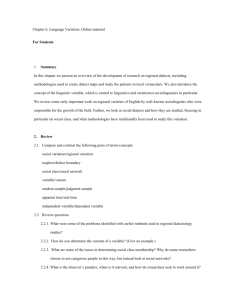Language ! Hello! ¡hola! bonjour ! こんにち 你好
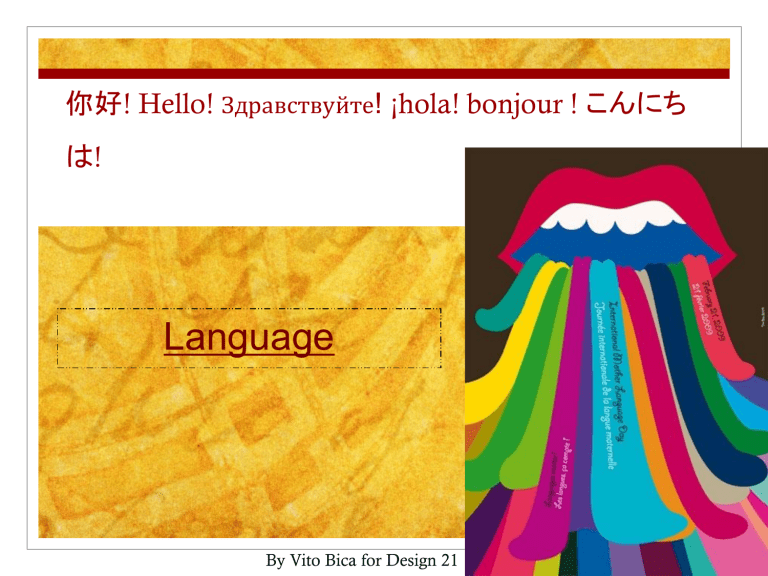
你好
! Hello!
Здравствуйте !
¡hola! bonjour !
こんにち
は
!
Language
By Vito Bica for Design 21
Objectives for the Chapter
Develop an appreciation for the significance of language to cultural identity.
Establish an understanding of the geographic distribution, globalization, and diffusion of the English language and its dialects.
Get a sense of the geographic distribution historical relationships of non-English language families.
Consider the situation of language extinction and potential solutions for language preservation.
Language
How would you define language?
Why is it relevant to study languages in a cultural geography class?
Language Family Tree
Language families are groups of languages that share an ancestral language in the distant past.
There are 90 language families, but six major ones.
The most widely spoken is Indo-
European.
Diffusion of Languages
One theory is that languages spread as a result of agriculture and the diffusion of farming cultures.
As opposed to hunters and gatherers, they were able to support larger populations.
Expansion of empires and trade were also important factors.
Diffusion of English
Film: The Rise of English
Summarize the global spread of English:
Where did it originate?
Possibly in the region north of the Black and Caspian Seas or in Anatolia
(region comprising much of Turkey) around 5000 BCE.
Where has it spread?
What kind of diffusion?
Responses to Global
Dominance of English
Language dominance – When one language becomes more powerful than another.
Today, English is the lingua franca, or a language of international communication. World’s English Mania
Yet, not all countries / regions are open to the dominance of English.
In the 70s and 80s, Québec faced a conflict between the dominant majority of French speakers and an English minority.
Quebec video – War of Words
A Global Language
World Resources Institute
Fact-o-rama
The globalization of English represents a threat to less widely used languages—or a conflict with local diversity.
There are roughly 6,900 languages.
Half of the world’s languages could disappear by 2100, with an average of one lost every two weeks.
Roughly 80% of the global population speaks 1% of the world’s languages
Preserving Language
Diversity
Endangered and Extinct Languages
Endangered languages – no longer taught to kids and isn’t used for everyday interactions.
Linguistic diversity index – expresses likelihood that two randomly selected individuals in a country will speak different first languages.
City of Endangered Languages , Three Thousand Languages
Extinct languages – have no living speakers, a “dead” language.
Languages revived: Hebrew (with the creation of Israel)
Preservation: Celtic languages
Living Tongues Institute for
Endangered Languages, 2007
Endangered Languages Map
Languages of Africa
Language and Dialects
Dialect – regional variation of a language. Unique vocab, spelling, and pronunciation.
Isogloss - Line that represents a word usage boundary.
Standard dialect– when a language has multiple dialects, one may be recognized as the most acceptable for government, business, and communications.
Dialects
Map Activity
Dialect Listening Activity
In the United States, there is greater variation in dialects from North to
South than East to West. What do you think explains this pattern?
Every word not used nationally has a geographic boundary, known as an isogloss.
Dialects
My Fair Lady
How does a person’s dialect influence what you think about them?
What are common stereotypes associated with dialects in the United States?
PSU
Review –Things to Focus on In
Reading and from Class
What is language? What does it include?
Language with the most speakers? Largest language family? Most dominant language?
Define language families. What family and branch is English part of ? Origin of the
Indo-European branch? Second largest family…what major language does it include?
Hearth of English, how did it diffuse historically? Today? Why do people learn
English today? Be able to refer to the “Rise of English” clip.
Be able to summarize main points of the video about Quebec.
What makes languages endangered? What are the concerns about this?
Dialects-relevant terminology, explanation of dialect distribution in the US (east/west vs. north/south, impact on stereotypes.
